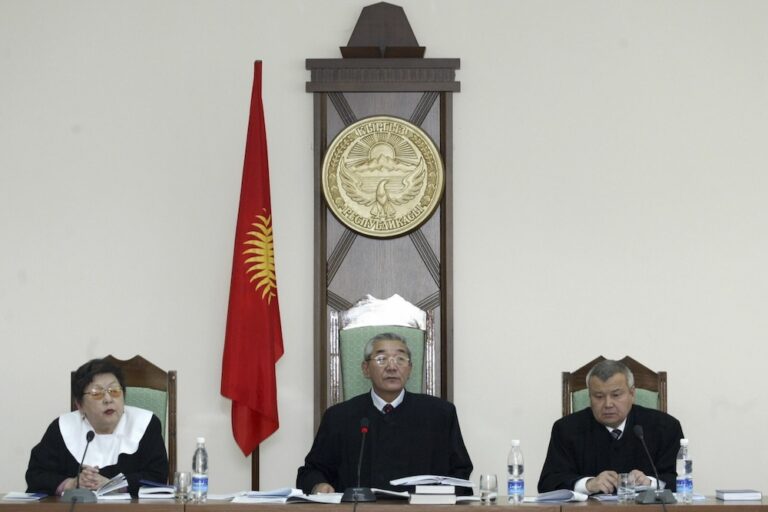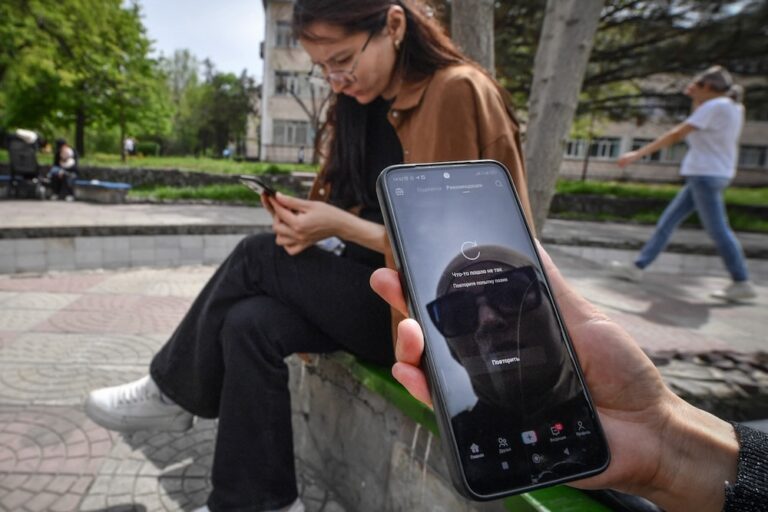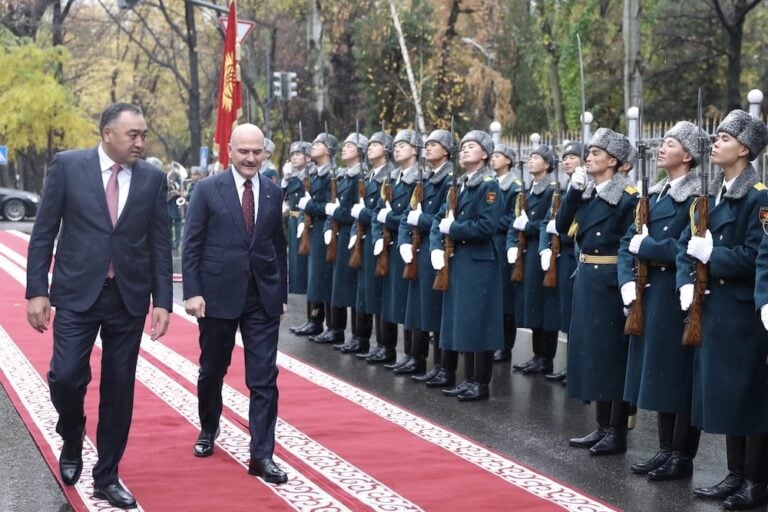(CPJ/IFEX) – The following is a 22 February 2008 CPJ letter to Kyrgyz President Kurmanbek Bakiyev: His Excellency Kurmanbek Bakiyev President of Kyrgyzstan Dom Pravitelstva Bishkek 720003 Kyrgyzstan Via facsimile: + 996 (312) 62 7072 and +996 (312) 21 8627 Dear Mr. President, The Committee to Protect Journalists is deeply concerned about the lack of […]
(CPJ/IFEX) – The following is a 22 February 2008 CPJ letter to Kyrgyz President Kurmanbek Bakiyev:
His Excellency Kurmanbek Bakiyev
President of Kyrgyzstan
Dom Pravitelstva
Bishkek 720003
Kyrgyzstan
Via facsimile: + 996 (312) 62 7072
and +996 (312) 21 8627
Dear Mr. President,
The Committee to Protect Journalists is deeply concerned about the lack of progress in the investigation into the October assassination of Alisher Saipov, editor of the independent Uzbek-language weekly Siyosat (Politics). Four months after this brazen crime, Kyrgyz officials in charge of the probe announced – amid conflicting press reports – that the investigation was suspended. The Saipov family was not informed of the suspension in time to seek reconsideration.
An ethnic Uzbek, Saipov, 26, was shot at a close range in downtown Osh on October 24, 2007. Saipov was a prominent journalist who edited a popular weekly on regional politics with a focus on Uzbekistan. He contributed reporting on Central Asian political and social issues to international broadcasters such as Voice of America and Radio Free Europe/Radio Liberty; reported for the London-based Institute for War and Peace Reporting; and wrote for regional news Web sites such as Ferghana and Uznews. In his articles, Saipov was openly critical of the policies of Uzbek President Islam Karimov and the regime’s brutal crackdown on human rights.
Prosecutors in Osh opened a criminal investigation immediately. The next day, presidential spokesperson Nurlan Shakiyev told journalists that the case was given a high priority and that you had taken it under your authority. Shakiyev said the head of your administration’s defense and security department, Gen. Omurbek Suvanaliyev, was put in charge of the investigation.
On October 29, as a testimony to the investigation’s promising start, Kyrgyz Ministry of Interior spokesperson Bakyt Seyitov told the press that investigators were looking at Saipov’s journalism as the possible motive. The same day, Seyitov told Reuters that investigators were exploring possible involvement of Uzbek security service agents in the murder. Immediately after the murder, police confiscated Saipov’s laptop computer, back issues of the Siyosat newspaper with his articles, and other reporting materials, according to CPJ sources. Investigators extensively and repeatedly questioned Saipov’s colleagues, relatives, and friends. Police also questioned an eyewitness.
Yet subsequent statements by Kyrgyz officials were confusing and controversial, casting doubt on the political will to solve the crime. On October 30, a day after Seyitov’s interview with Reuters, the Kyrgyz Interior Ministry released an official statement on Saipov’s murder. In the statement, widely picked up by the local press, the ministry focused on Saipov’s alleged dealings with banned radical Islamic movements, ignoring journalism as a possible motive. The statement outraged Saipov’s colleagues and prompted CPJ to meet with Zamira Sydykova, Kyrgyz ambassador in the United States, on November 1. Sydykova told CPJ that the Kyrgyz government is “fully committed” to investigating every lead in Saipov’s murder and that her government had committed some of its best investigators to the case. She pledged to take our delegation’s concerns to her superiors, including our request that the investigation consider the possibility that Uzbek authorities were involved in this case.
Despite these reassurances, authorities continued to ignore Saipov’s work in their investigation. In December, for instance, the head of the Kyrgyz Main Directorate for Combating Organized Crime, Melis Turganbayev, told local journalists that investigators were checking whether religious extremists or criminal groups had any involvement in the murder. Without citing evidence, Turganbayev dismissed the possibility of Uzbek secret service agents’ involvement in the killing, the local Delo Nomer newspaper reported on December 12. Turganbayev said investigators had a picture of two unidentified suspects who had been photographed around Saipov’s office the day before his killing. He also said authorities had traced the bullet casings found at the murder scene to a gun registered in the police database. Since then, authorities have made no arrests and have provided no information about the two suspects.
Two months later, on February 4, the investigation took an alarming turn. Olzhobai Kazabayev, an Interior Ministry press officer, told the Kyrgyz service of Radio Free Europe/Radio Liberty that the investigation into Saipov’s killing had been halted “because the two suspected individuals had not been captured” and no other evidence had emerged.
Adding further confusion, newly appointed Interior Minister Moldomusa Kongantiyev told the local press a week later that the investigation had been halted for a different reason – because the preliminary investigation period had expired. While promising to restart the probe, Kongantiyev said investigators would consider political, religious, and drug-related reasons for the killing, according to the regional news Web site Ferghana. It was troubling to learn that he did not mention journalism as a potential motive.
On February 14, CPJ spoke with Marat Koshoyev, head of defense and security department at your office, to clarify the reason for the investigation’s suspension. Koshoyev told CPJ the probe had been halted due to the authorities’ inability to identify the two alleged suspects. On February 15, CPJ sent a written information request to the Kyrgyz Ministry of Interior but has not received a response.
As an independent group that defends the rights of journalists to report the news without fear of reprisal, we are extremely concerned at the suspension of the investigation into Alisher Saipov’s murder. We are perplexed and disappointed at the conflicting statements made by government officials in charge of the probe, and authorities’ apparent unwillingness to consider Saipov’s sensitive journalism as a motive. We remain hopeful that you will use your authority to ensure that an exhaustive investigation – one that is open, transparent, and professional – takes place as soon as possible. We also call on you to guarantee that Saipov’s family is kept fully abreast of the probe’s progress. By doing so you will demonstrate Kyrgyzstan’s political will to solve this terrible crime, one that tarnishes your country’s international image as an emerging democracy.
Thank you for your attention to this urgent matter. We await your response.
Joel Simon
Executive Director
RECOMMENDED ACTION:
Send similar appeals to:
His Excellency Kurmanbek Bakiyev
President of Kyrgyzstan
Dom Pravitelstva
Bishkek 720003
Kyrgyzstan
Fax: + 996 312 62 7072 / 21 8627
Please copy appeals to the source if possible.


